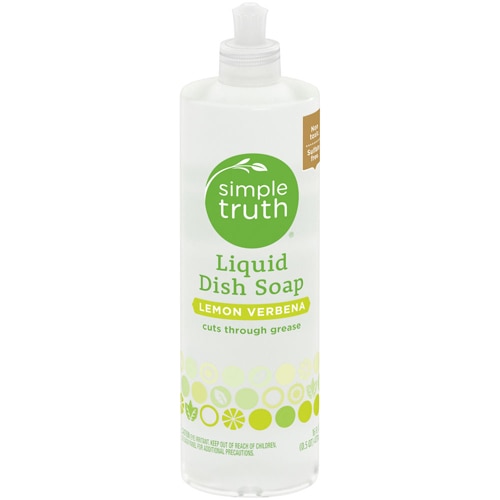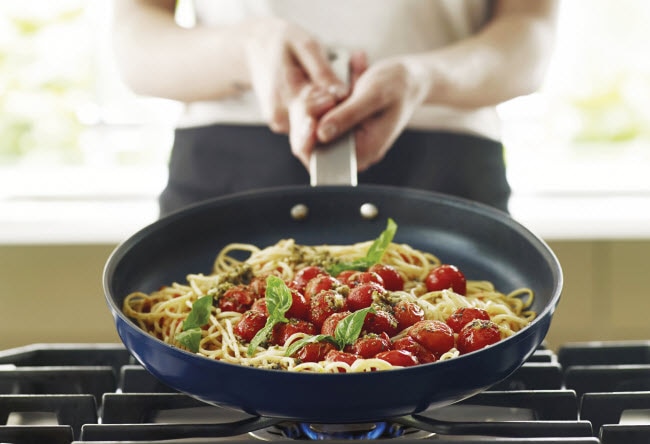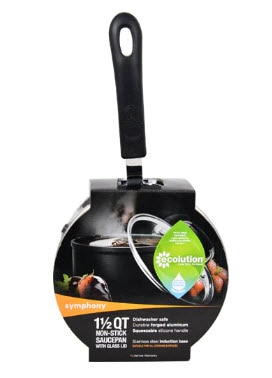If you’ve ever tried to get the residue of fried eggs off of a stainless-steel pan, you immediately grok why nonstick cookware is so popular. According to Good Housekeeping, in 2018 roughly 70 percent of all skillets sold in the United States had a nonstick coating. The special coating means food doesn’t bond to the pan’s surface. With a few swipes of the sponge, cleanup is done. Plus, the slick coating means you can use less oil or butter, which is an important concern for the weight- and health-conscious. But despite their indisputable convenience factor, nonstick pans come with their fair share of controversy.
First of all, there’s this: Many consumers are concerned about possible health consequences from ingesting polytetrafluoroethylene PTFE (also known as Teflon) or inhaling the fumes. In terms of ingesting Teflon, as strange as it sounds, many experts declare that to be the least of our worries. Because Teflon is an inert substance (doesn’t react with other chemicals), there’s no evidence that ingesting any PTFE flakes that might have flaked off the pan’s surface over time pose any health risk. According to the American Cancer Society, “Teflon itself is not suspected of causing cancer.” However, there are two more substantial concerns regarding Teflon.
The dangers of Teflon
- At very high temperatures, anywhere from over 570°F (300°C), Teflon coatings on nonstick cookware start to break down, releasing toxic chemicals into the air. The fumes can potentially cause temporary coughing, fever, and a sore throat, commonly referred to as “Teflon flu.” Not so fun fact: Pet birds, with their sensitive respiratory tracts, are particularly susceptible to developing a fatal form of PTFE flu. High temps tend to occur when a pan is preheated for too long without any food in it, since that can greatly increase the temperature.
- In recent years, there’s been more brouhaha over the related compound perfluorooctanoic acid (PFOA) used in the manufacturing of PTFE coatings. Many scientists believe that over time, PFOAs can leach into food through heating the cookware. The chemical has been linked with several forms of cancer and may be a contributing factor in thyroid disease. The International Agency for Research on Cancer classifies PFOAs as “possibly carcinogenic to humans.” It’s worth noting that PFOAs are found not just in pans, but also in microwave-popcorn bags, fast-food packaging, shampoo, carpeting, and clothing. As a result of the risks associated with PFOAs, since the end of 2015, PFOAs are no longer being used in Teflon products (in fact is PFOAs are now hardly being used at all in the U.S.).
What to use instead
EWG says quite simply, “Avoid non-stick pans and kitchen utensils. Opt for stainless steel or cast iron instead.” Why that may seem overly cautious, when companies replace one chemical with another, there’s no evidence that the new ones are truly any safer.
Stainless steel:
Durable and scratch-resistant, stainless steel excels for sautéing and browning food. It’s also dishwasher safe, making it easy to clean.
Cast-iron cookware:
When it’s seasoned properly, cast iron gradually becomes relatively nonstick. It lasts forever (almost) and can withstand extremely high temperatures. You can even put cast iron in the oven.
A bonus tip to make cleanup a breeze
One of the pain points of nonstick alternatives is that food gets stuck, making cleanup arduous. Try this excellent tip for removing burned on food: As soon as you are done cooking and have removed the food from the pan, add some water to cover the stuck residue. Heat the water up briefly, agitating the pan with a utensil. If the stuck bits still won’t come off, add some dish soap and let the pan sit for a while in the soapy water. If it’s still a no-go situation, put the pan back on the burner and boil the soapy water for 10 to 15 minutes. When the water cools, scrub the pan with a scouring pad, rinse, and dry.
Not ready to give up nonstick cookware? Check out the nonstick pans from Ecolution. Made with a stainless steel induction base, they're PFOA free! And, they're dishwasher safe.





